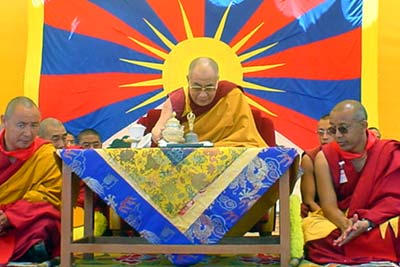After the Dalai Lama
By Jamyang Norbu, The Times of Tibet, Dec 14, 2004
Dharamsala, India -- The Dalai Lama at 67 is fortunately a healthy man, probably healthier and (on average) slightly younger than his chain-smoking adversaries in Beijing. Yet in recent years, discussions on life after the Dalai Lama has been fairly widespread among Tibetans, especially after Beijing, apparently convinced that the Tibetan question would just disappear with his passing, began saying it would never negotiate with him. Most Tibetans have a deep and natural faith in their leader, and would no doubt view his death as a traumatic blow.

But Tibetans are psychologically prepared for this eventuality, and for reasons beyond the fact that "impermanence" is an article of their faith. Tibetans' confidence in the future rests on their own religious and political traditions, which are more enduring than their devotion to a single man. Constitutional provisions are already in place, in the event of His Holiness?s death, for the election of a three-person council of regency, one of it?s duties being to oversee the long and arcane process of searching for his reincarnation.
Yet, in truth, the absence of the Dalai Lama would not altogether be a bad thing for the Tibetan struggle. Yes, His Holiness is the draw for much of the international publicity showered on the Tibetan cause, but this attention does little to advance Tibetan national interests. Most leaders and politicians in the developed world assuage their consciences by praising the man and his noble mission, all the while ignoring the Tibetan question in their policies. It is as if by being personally nice to His Holiness they hope to make up for their empty encouragement of his belief, that by surrendering independence he might arrive at an accommodation with Chinese leaders. Many Tibetans already question the wisdom of this path. His departure, a few are convinced, would shake Tibetan society out of such comforting delusions.
The Dalai Lama's presence in Tibetan political life is somewhat like the giant Banyan tree, whose shade is pleasant but under which little grows. Tibetan ministers give the appearance of being no more than messenger boys, and members of Parliament fall over each other in their eagerness to agree with him. The Dalai Lama himself has remarked upon the dilemma of his omniscient leadership, but has done little to resolve it. His absence might be just the thing that allows mature democratic institutions to take root. To be sure, without His Holiness's presence there is danger of dissension within refugee society. But exiled Tibetans already have a half-century of experience in the rough-and-tumble of India's robust democracy. Surely they are ready for their own.
The transformation of Dharamshala's court politics into a genuinely democratic forum would have a profound impact on Tibet's struggle for freedom. At the moment, Tibetans' faith in the Dalai Lama is as strong as their resentment of Chinese rule, but little else is clear. The success of the democratic experiment in exile would represent a sincere hope for Tibet's political future. And it would also be the best rebuttal of Beijing's propaganda that Tibetan independence would equal a return to theocratic feudalism.
Tibetans genuinely love the Dalai Lama, but his lofty ideas on world peace and universal compassion probably find more enthusiastic subscribers in California than in Tibet. Tibetans most wish to witness two events: a free Tibet and the Dalai Lama once again seated on his golden throne in the Potala Palace. There is no doubt ? at least to this observer ? that given half a chance, they are prepared to do whatever necessary to realize this dream. Unfortunately, there seems to be an underlying conceptual dissonance between the leader and his people. Take for example the annual March 10th rally in Dharamshala commemorating the 1959 Tibetan Uprising. In his last few speeches on this occasion the Dalai Lama carefully explained why relinquishing independence and accepting autonomy within China was the best hope for preserving Tibetan culture. The Tibetans in the crowd listened respectfully. But after His Holiness concluded, they marched away waving national flags and lustily shouting, "Independence for Tibet" ? as if they hadn't heard a word he said. It is worth recalling that in March 1959 Tibetans respectfully disobeyed the Dalai Lama's many appeals not to take up arms against the Chinese occupation army.
Still, it may be too early to speculate on a post-Dalai Lama period. He has assured Tibetans that he intends to live to a ripe old age and even joked that he might turn out to be "quite a handful, a real feisty old geezer" (porto lagpae khyoktse) With so much energy and spirit, perhaps he can begin to accomplish in life what many fear can happen only after his death.
Jamyang Norbu is a novelist, playwright and a leading political writer on Tibet


